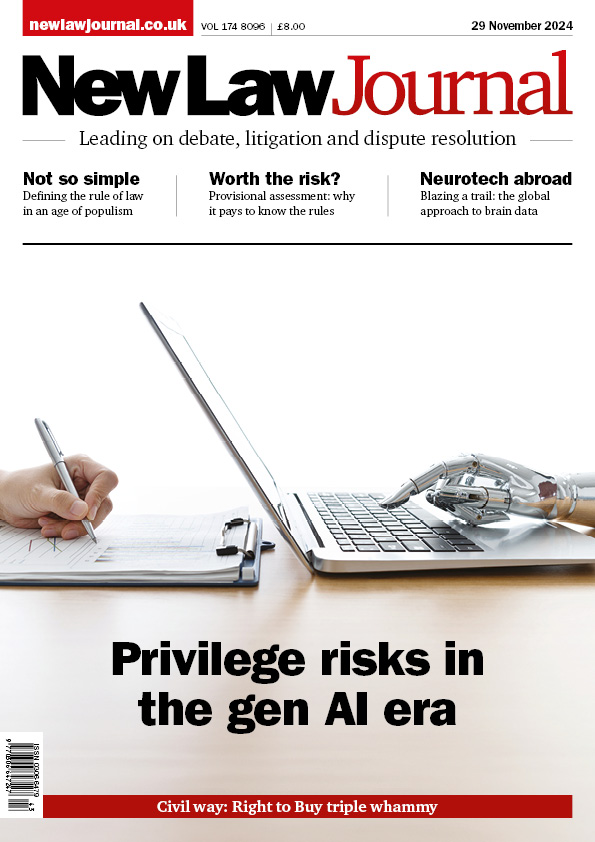THIS ISSUE

Is it bye bye Right to Buy? In this week’s 'Civil Way', former district judge Stephen Gold looks at changes to the discounts for secure tenants.
Prisons are in crisis, so what’s the plan to fix them? In this week’s NLJ, Helen Scambler, associate at Mishcon de Reya, comments on the government’s actions to date to repair the issue, and makes some suggestions on what they could do next.
Donald Trump, populism and the UK Attorney General Richard Hermer KC’s (pictured) recent speech on the rule of law are explored in former JUSTICE director Roger Smith’s NLJ column this week.
How does legal privilege apply to the use of generative artificial intelligence (gen AI) by lawyers? In this week’s NLJ, Olivia Dhein, knowledge lawyer at RPC, and Ben Roe, lead knowledge lawyer at Baker McKenzie, highlight some overlooked risks and consider various workplace scenarios.
How does UK law on neurorights compare to protections granted in other parts of the world? Part 4 of Harry Lambert and Bradley John-Davis’s fascinating series on neurotechnology and the law looks at neurotech law abroad, suggests the UK may be lagging behind, and explains that Latin America is leading the way.
It does proponents of the rule of law no harm to admit to its many uncertainties: Roger Smith warns against the temptation to oversimplify
Does the existence of a suitable alternative remedy rule out the option of judicial review? Nicholas Dobson weighs up the Supreme Court’s view
Successful non-party costs orders against credit hire operators are swelling in number: Sarah Jane Cartlidge considers whether these are just a drop in the ocean
How will the government reduce the prison population and ease the strain on the system? Helen Scambler examines the proposed measures
Olivia Dhein & Ben Roe explain how lawyers should think about privilege when using gen AI tools
MOVERS & SHAKERS

Freeths—Ruth Clare
National real estate team bolstered by partner hire in Manchester

Farrer & Co—Claire Gordon
Partner appointed head of family team

mfg Solicitors—Neil Harrison
Firm strengthens agriculture and rural affairs team with partner return
NEWS
Conveyancing lawyers have enjoyed a rapid win after campaigning against UK Finance’s decision to charge for access to the Mortgage Lenders’ Handbook
The Crown Prosecution Service (CPS) has launched a recruitment drive for talented early career and more senior barristers and solicitors
Regulators differed in the clarity and consistency of their post-Mazur advice and guidance, according to an interim report by the Legal Services Board (LSB)
The Solicitors Act 1974 may still underpin legal regulation, but its age is increasingly showing. Writing in NLJ this week, Victoria Morrison-Hughes of the Association of Costs Lawyers argues that the Act is ‘out of step with modern consumer law’ and actively deters fairness
A Competition Appeal Tribunal (CAT) ruling has reopened debate on the availability of ‘user damages’ in competition claims. Writing in NLJ this week, Edward Nyman of Hausfeld explains how the CAT allowed Dr Liza Lovdahl Gormsen’s alternative damages case against Meta to proceed, rejecting arguments that such damages are barred in competition law







